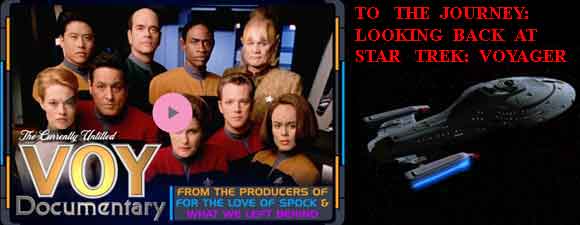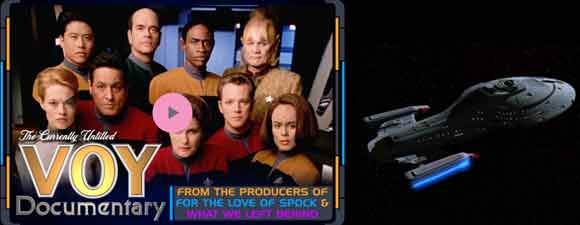Retro Review: Prime Factors
7 min readThe crew hopes to use Sikarian technology to get Voyager home, then learns that it violates the planet’s laws.
Plot Summary: Voyager receives an invitation to the planet Sikaris, whose inhabitants have been told of the stranded ship and wish to offer their hospitality to the crew. On the planet, Janeway is charmed by Sikarian generosity, particularly that of the magistrate Gath, who seems interested in her romantically. Meanwhile, a young woman who is attracted to Kim takes him to a private spot where he can tell her stories, which her culture values highly. Kim is astonished to learn that they have traveled across thousands of light years using a Sikarian spatial trajector, and tells Janeway that the technology could get the ship more than halfway home. But when Janeway tries to negotiate for the trajector, Gath says that his people have strict rules about sharing it, since it could be used for unethical purposes. When Janeway offers to trade Voyager’s entire library of literature, Gath agrees to take it up with the other magistrates, but when Janeway presses him, he insists that the crew would be better off remaining on Sikaris. Gath’s subordinate Jaret Otel contacts Kim to suggest a secret trade of the library for the technology. Janeway refuses to deal with anyone who isn’t an official representative of the Sikarian government, but Seska persuades Torres – with the help of Carey, who wants to get home to his family – to trade for the device without the captain’s permission. When Tuvok catches them with a copy of Voyager’s library, he does not punish them but agrees to make the trade himself. However, the trajector device uses the planet’s mantle to fold space and proves incompatible with Starfleet technology, nearly breaching the warp core until Torres uses a phaser to destroy it. A furious Janeway threatens to demote Torres if she ever betrays her trust again, then must tell Tuvok – who had concluded that it was logical to compromise his own principles to get the crew home, since Janeway could not to do so – that as an officer and a friend, he must obey the chain of command, regardless of his own logical or ethical beliefs.
Analysis: “Prime Factors” was always one of my favorite first season episodes, yet I’ve read very mixed reviews of it over the years, so I wasn’t sure how well it would hold up. The core of this story is Janeway, both how she responds to Gath’s manipulations and how she reacts when two of her closest associates betray her trust, and she remains as compelling as ever. I know people complain that she’s too emotional, but I think that’s just in comparison to Picard, who would have gritted his teeth; Picard was never tempted to indulge himself among the wonders of Farpoint Station, to which the marketplace on Sikaris seems quite similar, and he rarely showed the kind of unhappiness to crewmembers that Janeway does here. I have little doubt that, in a similar situation, Kirk would have paced around giving Spock impassioned lectures about the needs of his crew, and I’m not sure that Kirk wouldn’t simply have concluded that the equivalent of the Prime Directive shouldn’t apply in this situation. We do not, after all, know how or if Gath was elected, nor how many of his people are dissatisfied with his leadership, so it does seem a bit nitpicky for Janeway to decide that he must represent the only legitimate authority on the planet, particularly once she knows he hasn’t spoken to the other magistrates and has been manipulating her from the first. I’m even inclined to doubt Gath’s authority to order the entire crew to leave. I do think that all the other Starfleet captains we know well would have responded more aggressively to his tantrum accusing Janeway of judging him. But Kirk’s misery over a dead android in “Requiem for Methuselah” is more woebegone than anything we’ve seen from Janeway, while Sisko is perfectly capable of throwing tantrums of his own, so I’m not particularly disturbed by her very visible unhappiness when she must concede that the Sikarian technology has eluded her.
I don’t love Janeway’s inflexibility about the legal details any more than Seska does, particularly since her sense of the Prime Directive in “Caretaker” and “Time and Again” seemed closer to Kirk’s than to Picard’s. If she could allow the authorities in “Ex Post Facto” to identify traitors because of Voyager’s presence or let people from “Emanations” learn that everything they believed about their afterlife might be wrong, I’m inclined to think that swapping a library for some technology that apparently can be stolen with relative ease by the natives is less problematic. As Tuvok says, she pledged herself to get the crew home, and it isn’t just the Maquis who are getting restless waiting to see if she’ll keep that promise, though curiously we don’t get to hear how Carey reacts after the fact – just Seska, whose primary concern is covering up her role in the rebellion, and Torres, who is disappointed she let herself be pressured into trying it. I wish she’d made the speech about Federation friendship and fellowship that Kirk or Picard would undoubtedly have unleashed on Gath, instead of letting his evident attraction to the captain serve as the major inducement for negotiation. Gath doesn’t bother to find out whether his behavior counts as intimidation or harassment in the culture of his guests, making his own exaggerated outrage at Janeway’s refusal to assimilate his values that much more annoying. But since the audience knows there will be some contrived reason for not getting closer to home, what really matters is how she deals with her own crew, which I think is perfect, sticking to Starfleet by-the-book lecturing for relatively new officer Torres, invoking many years of trust and collaboration with Tuvok. The straightforwardness about her own wishes and disappointments is what Paris and Kim expect of her when they decide to tell her about the trade possibility instead of taking matters into their own hands as Torres, Seska, and Carey do. I do wish Janeway had taken Chakotay into her confidence more, particularly since she began by hoping that the Starfleet and Maquis crews were finally enmeshed into a cohesive unit, and I wish he’d been more specific about when he thinks Starfleet officers have a right to ignore the Prime Directive on ethical grounds.
Unlike some fans I know, I don’t have a problem with how quickly the Starfleet-Maquis tension disappears on the ship, but it would be nice to see that it’s for the right reasons, because the command team is on the same page ideologically. Chakotay and Tuvok seem very much in agreement in this episode despite their previous animosity and it would have been more dramatic to get some exploration of how that happened. Instead the focus remains on Janeway and Tuvok, though the final scene between them is quite powerful, reminiscent of the ending of DS9’s “Necessary Evil,” when Kira asks Odo whether he’ll ever be able to trust her again and he isn’t sure how to answer. The stakes are lower here – no one has committed murder – but Tuvok has been the one person Janeway has been able to treat fully as a friend and equal, since his rank is close to her own and he never turned his back on Starfleet. Without him, she’s even more isolated than Torres, who is caught in a tough position between a resentful Starfleet underling and a friend from the Maquis who doesn’t hesitate to try to manipulate her. (It’s so much fun watching Seska in these early episodes, knowing now who she really is, while she goes on about needing to get back and rescue the Maquis!) And it’s interesting to see that Tuvok apparently picked up some Maquis ways of thinking while he was serving under Chakotay, whom it’s clear to him is an honorable man. I have the impression that Chakotay may find life less complicated stranded in the Delta Quadrant, not having to deal with the Cardassians or the Federation, than it was in the Maquis, to which even Torres seems more anxious to return despite the fact that she told Kim in “Eye of the Needle” that there was no one she was personally desperate to see the way Carey is with his sons. Maybe crew efficiency shouldn’t be such a top priority: Janeway’s got Starfleet and Maquis crews work well enough to conspire together, and Tuvok is willing to pull a Valeris in what he believes is her crew’s best interests.







Gilligan and Skipper almost got everyone off the island again this week, but……
A good story with very average acting at the beginning,
but ending with a great (and quite intense) Janeway moment. My rating: 8/10.
One of the better first season episodes. Supposedly the Sikarians were supposed to be recurring alien foils for Voyager but that never panned out. Along with the Vidians, they were one of the more intriguing aliens encountered in the new quadrant.
http://i.imgur.com/TWfpI9y.jpg
I loved this episode. I loved putting the shoe on the other foot and having the Federation people be the primitives who couldn’t be given advanced toys because they might hurt something. I thought that was a brilliant idea, and I wish the episode had done a little more with it, but doing it at all was cool.
I liked it that B’Elenna has gone from being a hothead to someone who has to confess to the captain when she screws up; it’s nice to see that she’s grown.
And I loved the whole thing with Tuvok. The idea that he’s Janeway’s moral counselor makes sense to me, coming as I do from a TOS-only background. (I lived in a TV-free household for a couple of decades, so I saw TOS before moving into it but none of the others. I’m just now watching Voyager for the first time.) Spock’s wonderful ethics and incredible goodness is part of why I love him so, and it was nice to see that this new Vulcan was also considered a moral resource. And then, when he goes against Janeway’s orders and all but SAYS that it’s out of love for her (I don’t mean romantic love), well, that was quite a moment. Vulcans won’t SAY “I love you,” but “I compromised my principles in an effort to make you happy” sounds like a declaration of love to me. 🙂
I love moral dilemmas, I love character development and character relationships, and I love exploration of new cultures. This episode was heavy on all of those factors, and I found it highly enjoyable. It doesn’t reach the level of genius that “Amok Time” or “Journey to Babel” or “The Devil in the Dark” did — I’m not saying it’s one of the greats — but it felt like Star Trek to me. 😉
After careful consideration, it’s horse shit
Don’t put too much thought into it. You’ll hurt yourself!
Liked it.